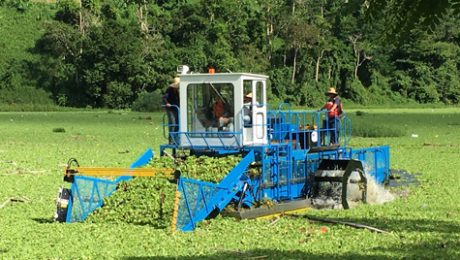Heavy metal poisoning is a growing concern in many parts of the country. A new method for removing chromium-6, a highly toxic heavy metal, from waste water has been developed by a group of scientists from India and Ethiopia. They claim it to be low-cost and safe. The new method uses water hyacinth, a weed
In Stockton, California managers have been trying to keep the water hyacinth that washes in from the Delta under control with herbicide treatments. Unfortunately even after 15 applications, the hyacinth has extended beyond the level of control. Port officials say a state spraying program failed to control the hyacinth, so they contracted with a Bay
Authorities in the Medong delta province of Hau Giang have banned local authorities from spraying herbicide to the water hyacinth. This fast growing plant has slowly been taking over and blocking waterway traffic on rivers and canals in the area. Many people breed water hyacinth locally to use for making exportable products such as baskets
Water hyacinth is a free floating aquatic plant that is native to South America. One of the fastest growing plants known, water hyacinth can double their population in two weeks. When not controlled, the aquatic plant will cover lakes and ponds entirely, dramatically affecting water flow, blocking sunlight from native aquatic plants and starves the
A Ballina councilor says the endemic north coast weed water hyacinth could be used strategically to remove excess phosphorous from Lake Ainsworth in Australia. Cr Jeff Johnson said a recently completed Ballina Council report into the water quality in Lake Ainsworth revealed that phosphorus levels have increased by approximately 100 per cent over the last
Water hyacinth has been on the Delta for decades, but really exploded in 2011 and 2012 as officials were not able to obtain a permit to spray chemicals in a timely fashion. Efforts to control hyacinth in the Deltas focuses primarily on the use of chemical herbicide applications. Officials aggressively spray chemicals; a prepared document
Water hyacinth has been the scourge of the Delta in recent years, but by this summer it could be providing the power to city lights. A pilot project is in the works to harvest it for biogas. Port of Stockton Environmental Manager Jeff Wingfield says the port is proposing a pilot project to harvest the
Nyamitanga Division Chairperson Moses Karanzi Kajubi says the move to manually remove the water weed should be supported instead of being criticized. He says that they intend to do the cleaning of the river at least once a month, by pulling the water weed out of the water and cut it into pieces so that
Lee County Hyacinth Control manages aquatic plants in our waterways using several different methods. The mechanical weed harvester is an eco-friendly method clears widespread vegetation so boats can navigate through our canals. Run off in Cape Coral canals comes from many places. It could be your street, your roof or your lawn. The recycled water
In 1909, the United States was suffering a shortage of meat. At the same time, Louisiana’s waterways were being choked by invasive water hyacinth. The solution seemed to be simple, the American Hippo Bill. Hippos could be imported to the United States to eat the water hyacinth and people can eat the hippos. The bill
- 1
- 2







